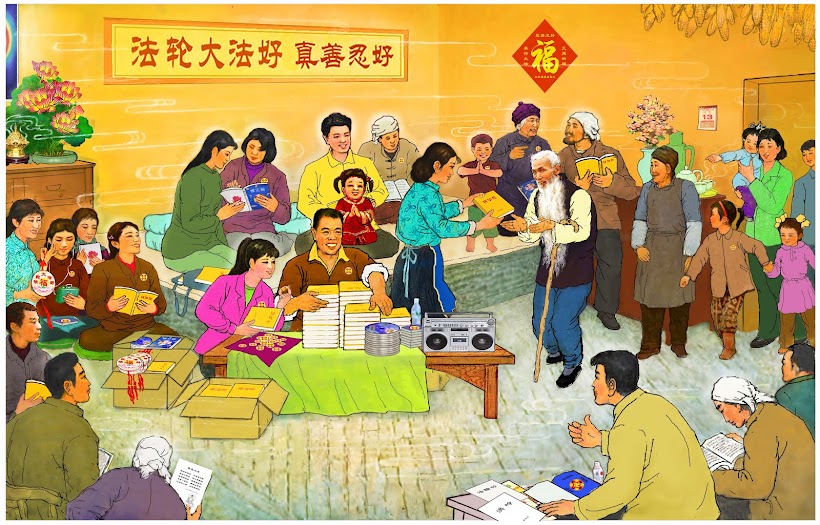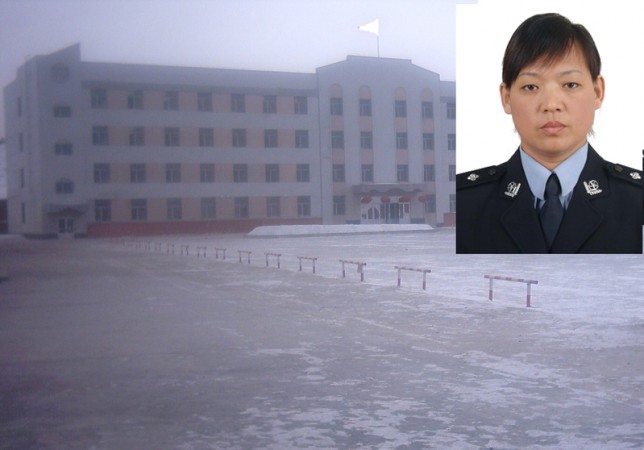Growing desperate that the Falun Gong practitioners still clung to their faith, Jiamusi labor camp authorities decided to try a psychological approach—Falun Gong books were issued to policemen, and they were ordered to read them and refute the teachings, part of the attempt to force practitioners to recant their faith.
Cui was given “Zhuan Falun,” Falun Gong’s main textbook. After reading it, “the unexpected happened,” wrote her 26-year-old son in a letter to the public prosecutor in Jiamusi.
Cui quit drinking, stopped playing mahjong—a Chinese tile game that is often used for gambling—cut down on vulgar language, and became healthier. “Zhuan Falun completely changed my mother’s life,” her son wrote.
Jenny Li, Epoch Times and Larry Ong, Epoch Times | August 2, 2015
Cui Huifang, a former policewoman and participant in the persecution of Falun Gong practitioners, was moved by the behavior of those she persecuted and became a practitioner herself. (Minghui.org)
When Cui Huifang spotted an elderly labor camp inmate perform slow-moving qigong exercises, she immediately flew into a rage and punched the septuagenarian with such force that she staggered backward and slammed into a metal bed frame.
How dare she do the exercises during my shift, thought Cui, then a policewoman at a Forced Isolation Rehabilitation Center in the northeastern Chinese city of Jiamusi in Heilongjiang Province.
Hurling insults and beating up practitioners of Falun Gong—a traditional Chinese spiritual discipline that involves gentle exercises and adherence to teachings of truthfulness, compassion, and forbearance—was a familiar routine for Cui after persecution of the practice started, at the behest of former Communist Party boss Jiang Zemin, in July 1999.
But before long, Cui had a change of heart. In fact, right after throwing that punch, she immediately had the thought: Please don’t be hurt.
This January, Cui, 52, retired as a policewoman. On Feb. 12, public security officers raided her home, abducted her, and have since kept her in a detention center in Jiamusi, in the far northeast part of China, bordering Siberia.
Near the end of July, Cui got her relatives to mail a criminal complaint on her behalf to the nation’s highest court and prosecuting body against Jiang Zemin. Over 100,000 complaints have been lodged against Jiang, an attempt to have the Chinese authorities live up to their own promises about the rule of law, to prosecute the former Party leader for crimes against humanity and genocide.
“I was an active member and witness of the bloody persecution campaign against Falun Gong,” Cui wrote in her complaint. “I have also personally experienced the goodness of Falun Gong, and became a practitioner.
“Now, I am also a victim of the persecution.”
‘The Unexpected Happened’
In labor camps, Falun Gong practitioners are subjected to brainwashing, abuse, and torture in an attempt to get them to give up their faith. Hundreds of thousands have been persecuted in this manner at any given time, and over 3,800 have been persecuted to death, according to the official Falun Gong website Minghui. The numbers are thought to be much higher, but it is difficult to get independent information out of China given the Communist Party’s tight controls.
Cui Huifang initially thought nothing of persecuting Falun Gong practitioners. Years of routinely torturing labor camp prisoners as part of their “reformation” had numbed her to the act; some of her colleagues even enjoyed it.
But the behavior of Falun Gong practitioners started to move Cui. The practitioners not only showed no hatred to their torturers, they returned the brutal abuse by Cui and others with kindness.
“As time passed, I became more and more inclined toward the Falun Gong practitioners,” recalled Cui to a friend, who wrote it in a letter to the public prosecutor in Jiamusi.
Growing desperate that the Falun Gong practitioners still clung to their faith, Jiamusi labor camp authorities decided to try a psychological approach—Falun Gong books were issued to policemen, and they were ordered to read them and refute the teachings, part of the attempt to force practitioners to recant their faith.
Cui was given “Zhuan Falun,” Falun Gong’s main textbook. After reading it, “the unexpected happened,” wrote her 26-year-old son in a letter to the public prosecutor in Jiamusi.
Cui quit drinking, stopped playing mahjong—a Chinese tile game that is often used for gambling—cut down on vulgar language, and became healthier. “Zhuan Falun completely changed my mother’s life,” her son wrote.
Becoming a Falun Gong practitioner was a struggle for Cui. When reading “Zhuan Falun,” Cui felt that Falun Gong “is righteous and teaches people to be kind” and felt the “injustices” of the Communist Party’s slander of the practice. But then she immediately put down the book and thought, “How can I think like that; I’m a policewoman with a job and a family!”
Remarkable Story
Being a first-hand witness to the “harsh terror in China” eventually strengthened Cui’s resolution to practice Falun Gong.
A year before she retired, Cui decided to show support for Falun Gong practitioners who were tortured in Jiansanjiang prison in Heilongjiang. Then, local police beat up and detained the lawyers—Tang Jitian, Jiang Tianyong, Wang Cheng, and Zhang Junjie—who had sought to defend the practitioners.
After the Jiansanjiang case, Cui realized that she was being followed and monitored by the authorities. They made their move in February, arresting her on the charge of “holding state secrets and confidential documents.”
Beijing-based lawyer Li Xiongbin met with Cui, and told Minghui that the charge was “only a formality” and that the key issue behind her arrest was her remarkable story—a former policewoman who became a Falun Gong practitioner.
Cui Huifang “became a practitioner because of her experiences, and she’s telling people why she practiced and what the practice is,” said Li.
“This has a shocking effect on people.”



